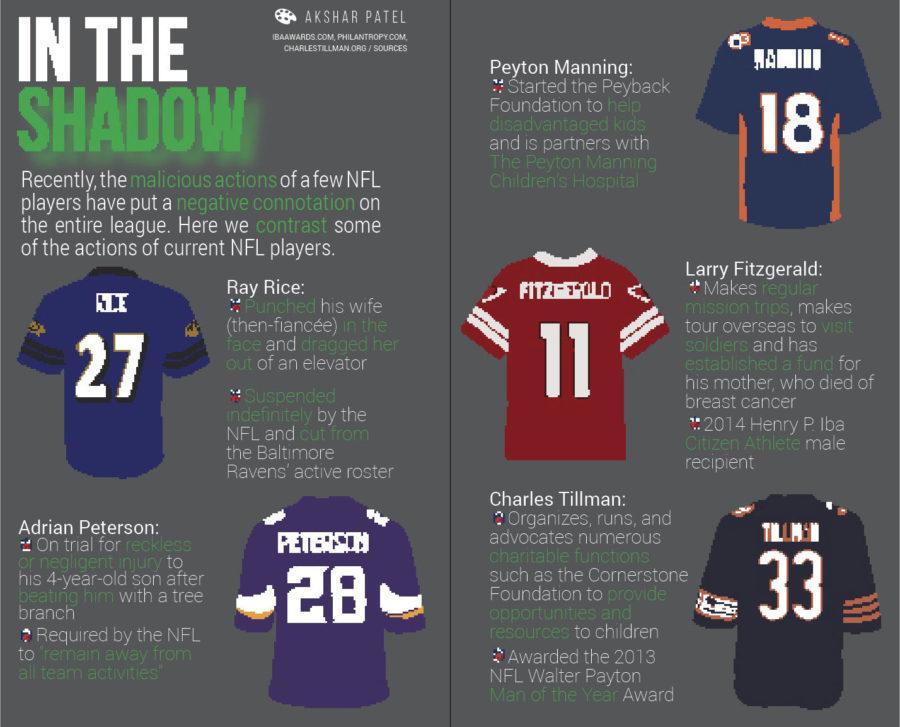His impact is felt far beyond his sport. In the off-season, he has traveled across the world to Africa, India and the Philippines (just to name a few) for mission trips. He has made tours to visit soldiers overseas and has established a memorial fund for his mother, who died of breast cancer. The Rotary Club of Tulsa selected him as the 2014 Henry P. Iba Citizen Athlete Male Recipient. The award, according to its website, ibaawards.com, “recognizes an influential male and female athlete for their success in their sport and more importantly, for being positive role models who give back to their communities.” And the list goes on.
This is Larry Fitzgerald, wide receiver for the NFL’s Arizona Cardinals, an eight-time Pro-Bowler and one of the best in the league. He plays for the NFL, the same organization that supposedly breeds violence and abuse, evidenced by Ray Rice, former Baltimore Ravens running back, who punched his then-fiancée in the face and unceremoniously dragged her out of an elevator. That video is awful—a cringe-worthy and terrible example of domestic violence. I’m sure you’ve also heard of Vikings running back Adrian Peterson, one of, if not, the best running backs in the NFL in recent years, who is on trial for reckless or negligent injury after beating his 4-year-old son with a tree branch, leaving lacerations. This brutal beating by Peterson and the gross domestic abuse by Rice, both prominent NFL players, have overshadowed the entire organization of the NFL as a league of violence, which grossly misinterprets the league.
It is important to remember how enormous the NFL truly is. According to an August 2013 article from Forbes, the NFL’s revenue was predicted to be “somewhere just north of $9 billion.” The NFL has an absolutely monstrous market. It is an economic powerhouse. With this enormous market and fan base, every single player’s actions, especially an exceptionally good player like the aforementioned Rice or Peterson, has the tendency to get blown incredibly out of proportion. Yes, what Rice and Peterson did was wrong. Both of their acts were downright malicious, but there are 53 players on each active roster of the 32-team league. So, they are just two of more than 1500 players on the NFL roster (or were, rather, now that Rice is serving an indefinite suspension). This is less than one percent of the entire league. I am not condoning either Rice or Peterson’s actions a single bit, and I know they are not the only ones, but it imperative to not allow the actions of a few players define an entire league.
I point again to Fitzgerald and all of his off-the-field charitable works. He is a phenomenal NFL player and citizen. He’s no monster; in fact, he seems like a pretty darn good person. And he’s not the only one. How about Peyton Manning, who not only is a record-shattering, top-notch quarterback, but also started the Peyback Foundation to help disadvantaged kids? Not only is Manning not a criminal, but he is a great role model. We have a hospital right here in Indianapolis named “The Peyton Manning Children’s Hospital.” Or what about Charles Tillman, who is a cornerback for the Chicago Bears? Tillman’s Cornerstone Foundation, founded in 2005 provides “opportunities and resources to children and their families in need” according to charlestillman.org.
The truth of the matter is, like in any organization, there are the good and the bad. In the NFL, it is no different. While Rice and Peterson may have stained the league’s good name, there are more players like Fitzgerald and Manning who have quietly been doing good for a long time.
Often, evil actions overshadow charitable ones. Don’t let the actions of a few individuals blind you to the league as a whole.































![What happened to theater etiquette? [opinion]](https://hilite.org/wp-content/uploads/2025/04/Entertainment-Perspective-Cover-1200x471.jpg)














































![Review: “The Immortal Soul Salvage Yard:” A criminally underrated poetry collection [MUSE]](https://hilite.org/wp-content/uploads/2025/03/71cju6TvqmL._AC_UF10001000_QL80_.jpg)
![Review: "Dog Man" is Unapologetically Chaotic [MUSE]](https://hilite.org/wp-content/uploads/2025/03/dogman-1200x700.jpg)
![Review: "Ne Zha 2": The WeChat family reunion I didn’t know I needed [MUSE]](https://hilite.org/wp-content/uploads/2025/03/unnamed-4.png)
![Review in Print: Maripaz Villar brings a delightfully unique style to the world of WEBTOON [MUSE]](https://hilite.org/wp-content/uploads/2023/12/maripazcover-1200x960.jpg)
![Review: “The Sword of Kaigen” is a masterpiece [MUSE]](https://hilite.org/wp-content/uploads/2023/11/Screenshot-2023-11-26-201051.png)
![Review: Gateron Oil Kings, great linear switches, okay price [MUSE]](https://hilite.org/wp-content/uploads/2023/11/Screenshot-2023-11-26-200553.png)
![Review: “A Haunting in Venice” is a significant improvement from other Agatha Christie adaptations [MUSE]](https://hilite.org/wp-content/uploads/2023/11/e7ee2938a6d422669771bce6d8088521.jpg)
![Review: A Thanksgiving story from elementary school, still just as interesting [MUSE]](https://hilite.org/wp-content/uploads/2023/11/Screenshot-2023-11-26-195514-987x1200.png)
![Review: "When I Fly Towards You", cute, uplifting youth drama [MUSE]](https://hilite.org/wp-content/uploads/2023/09/When-I-Fly-Towards-You-Chinese-drama.png)
![Postcards from Muse: Hawaii Travel Diary [MUSE]](https://hilite.org/wp-content/uploads/2023/09/My-project-1-1200x1200.jpg)
![Review: "Ladybug & Cat Noir: The Movie," departure from original show [MUSE]](https://hilite.org/wp-content/uploads/2023/09/Ladybug__Cat_Noir_-_The_Movie_poster.jpg)
![Review in Print: "Hidden Love" is the cute, uplifting drama everyone needs [MUSE]](https://hilite.org/wp-content/uploads/2023/09/hiddenlovecover-e1693597208225-1030x1200.png)
![Review in Print: "Heartstopper" is the heartwarming queer romance we all need [MUSE]](https://hilite.org/wp-content/uploads/2023/08/museheartstoppercover-1200x654.png)



